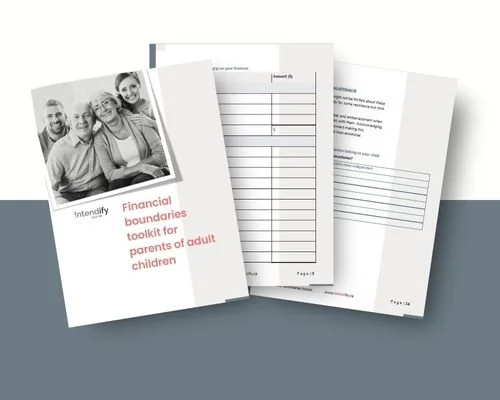Set financial boundaries with your family and protect your relationships
This page is designed to help you notice where money issues are straining your family relationships and why boundaries matter.
Money has a way of sneaking into family relationships and quietly changing how they feel.
You might be lending money you can’t comfortably afford. You might be paying for someone else’s things to avoid conflict. You might feel anxious every time a certain person calls, because you already know what the conversation is going to turn into.
This usually means you care deeply about that person and that you learned, somewhere along the way, that keeping the peace mattered more than protecting yourself.
Financial boundaries with family usually aren’t cold or selfish choices. They’re decisions people make because they care deeply and don’t want money to quietly damage relationships they value.
This guide is designed to walk you through how to set financial boundaries that protect both your money and your relationships. Inside, you’ll see what this looks like in real life, why financial boundaries actually reduce tension, the most common thoughts that keep people stuck, and where to start if this feels overwhelming.
What it means to set financial boundaries with your family
Setting financial boundaries with your family means deciding, ahead of time, what kind of financial help you can realistically offer and what crosses the line for you. It’s the difference between responding from pressure and responding from clarity.
It means you stop making money decisions in the moment, when emotions are high, or guilt is loud. Instead, you choose limits that protect your financial stability and your peace, even when the conversation feels uncomfortable.
Financial boundaries don’t require cutting people off or refusing all help. They’re often about narrowing the scope of your help so it stays sustainable instead of draining.
Here are a few small examples:
You might decide that you don’t lend money anymore, but you’re willing to help someone look over a budget or find resources that could help them get back on track.
You might choose a clear limit, like helping with one specific expense once, instead of covering ongoing costs that quietly become expected.
You might stop paying for things just to avoid conflict, even if that means sitting with someone’s disappointment for a while.
You might set a rule that you don’t discuss money over text or during emotional moments, and instead have those conversations at a calmer time when you can think clearly.
You might decide that your own savings, debt repayment, or household needs come first, and that helping others can only happen after those priorities are met.
At their core, financial boundaries are not rules you use to control other people. They’re decisions you make to protect your capacity, your finances, and your relationships over the long term.
Laura’s story (with permission)
Laura came to me because she wanted help setting financial boundaries with her younger sister. Her sister was regularly asking her for money instead of taking responsibility for her own financial situation, and Laura felt stuck between wanting to be supportive and feeling increasingly resentful.
The situation didn’t start this way. When Laura’s sister was laid off, she asked for help covering expenses while she figured out her next steps. That felt reasonable to Laura. She had the means to help, and she genuinely wanted to support her sister during a difficult transition.
Over time, though, the requests didn’t slow down. Her sister continued to ask for money to maintain a lifestyle she had grown used to while living with their parents, even though her income no longer supported that lifestyle. Instead of adjusting her spending or making changes, she relied on Laura to fill the gap.
Laura knew something wasn’t right, but she struggled to name it. She kept telling herself that family helps family, and she worried that saying no would damage the relationship or make her look unsupportive.
The clues and what we uncovered
As we talked, a few things became clear. Laura was saying yes automatically, often before she had time to think about whether helping actually felt okay. She avoided conversations about limits because she didn’t want to cause conflict or be seen as the “bad guy.”
We uncovered that Laura wasn’t just lending money. She had quietly taken on the role of financial safety net. What began as emergency support had turned into ongoing financial enablement, and no one had ever paused to acknowledge that shift.
That explained why Laura felt resentful and anxious. She wasn’t upset because she didn’t care. She was upset because she was carrying a responsibility that didn’t belong to her.
What we decided to do about it
We started by getting clear on the difference between support and enablement. Laura defined what kind of help she felt comfortable offering and what crossed the line for her.
She decided to stop providing money that sustained her sister’s lifestyle and instead set a clear boundary around financial support. We worked on a calm, respectful way to communicate that boundary without blaming or lecturing. The focus stayed on Laura’s limits, not her sister’s choices.
Laura also practiced slowing down her responses. Instead of answering requests immediately, she gave herself time to decide from a grounded place rather than reacting from guilt or pressure.
The result
The first conversations were uncomfortable, and Laura expected that. Her sister was frustrated, and Laura had to sit with the discomfort of holding her boundary.
What changed was Laura’s sense of stability. She stopped feeling resentful and anxious. She no longer felt responsible for maintaining someone else’s lifestyle. Over time, the relationship became more honest and less tense because expectations were clear instead of unspoken.
Setting financial boundaries didn’t push her sister away. It allowed Laura to show up without resentment, which ultimately protected the relationship.
Why setting financial boundaries protects relationships
Share this guide on Pinterest.
Many people fear that financial boundaries will damage their relationships. In reality, the absence of boundaries is often what causes the damage.
When money flows without limits, it creates unspoken agreements. One person becomes the helper. The other becomes the asker. Over time, resentment builds on one side and dependence grows on the other, even if neither person wants that dynamic.
Financial boundaries do three important things:
First, they replace assumptions with clarity. When everyone knows what you can and cannot do, there’s less room for misunderstanding.
Second, they reduce emotional pressure. You’re no longer deciding in the moment, under stress, or out of guilt. You’re responding from a place of intention.
Third, they protect long-term connection. Relationships tend to last longer and feel healthier when money isn’t quietly eroding trust, comfort, or respect.
Setting boundaries doesn’t mean you stop caring. It means you decide how you show care in ways that are sustainable.
You might be thinking
-
What this usually means
Guilt often shows up when you were taught that love equals sacrifice. You may have learned that being generous meant putting your own needs last or that saying no was a sign of selfishness. In families, guilt can also be reinforced by comments, tone, or past dynamics where you were expected to step in.
Quick wins
Start by delaying your response. Instead of answering immediately, try, “Let me look at my finances and get back to you.” This gives you space to decide instead of reacting.
Practice separating guilt from responsibility. Feeling guilty doesn’t automatically mean you’re doing something wrong. It often means you’re doing something new.
Why this works
When you slow the decision down, you shift from emotional reflex to intentional choice. That space makes it easier to choose a response that aligns with your limits instead of your fear.
Tools that might help
Book: *Set Boundaries, Find Peace by Nedra Glover Tawwab
A modern classic on boundary-setting. Clear, compassionate, and action-focused. While not money-specific, it gives you the language and confidence to stand firm without guilt.Podcast: Beyond Finances - episodes on family money dynamics
-
What this usually means
This thought often comes from fear. You may be worried about real consequences if you step back. You may also be carrying the belief that you are the only safety net. Over time, this creates pressure and quietly positions you as responsible for someone else’s financial stability.
Quick wins
Limit the scope of your help instead of eliminating it. This could mean setting a maximum amount, a timeframe, or specific expenses you will not cover.
Ask one redirecting question, such as, “What other options have you looked into?”This gently shifts responsibility back without abandoning the relationship.
Why this works
Reminding your family member that they have the responsibility for their own finances often helps them see the dynamic differently.
Tools that might help
Book: *Boundaries by Dr. Henry Cloud and Dr. John Townsend
A faith-based but widely applicable guide to setting boundaries with family, friends, work, and more. Includes examples of what healthy boundaries look like and how to hold them.
I’ve reread this one 6 times. I highly recommend it if you struggle with setting boundaries.
-
What this usually means
Money conversations often explode because they happen at the worst possible time. Boundaries are raised during moments of urgency, frustration, or resentment. Without structure, the conversation becomes emotional instead of productive.
Quick wins
Choose timing intentionally. Have boundary conversations when no one is actively asking for money.
Use clear, neutral language that focuses on your limits rather than their behavior. For example, “I’m no longer able to lend money” is less inflammatory than explaining why they should change.
Why this works
When conversations are calm and planned, people are more likely to hear the boundary instead of reacting to the emotion behind it.
-
What this usually means
You can’t communicate a boundary you’ve never defined. Many people react to money requests without ever deciding what feels sustainable. This keeps you stuck in a cycle of stress and second-guessing.
Quick wins
Start with one reflection question: “If nothing changed, how would this feel in six months?” The answer often reveals where your limit already exists.
Test one simple boundary. For example, “I don’t lend money anymore, but I can help brainstorm options.” You can adjust as you learn.
Why this works
Clarity builds confidence. Once you know your actual limit, communication becomes simpler and less emotionally charged.
Tools that might help
Book: *The Financial Diet by Chelsea Fagan
A smart, snappy book that covers money, mindset, and lifestyle. Great if you want a down-to-earth, millennial-friendly take on managing your finances with intention.
*Heads-up: Some of the links on this page are affiliate links, which means I may earn a small commission if you choose to make a purchase, at no extra cost to you. I only recommend tools and resources I genuinely believe are helpful. Thank you for supporting the work I do here.
Mabel’s Corner: Are you really going to say no?
Mabel says:
”Oh dear. Someone asked you for money again, and you're thinking about setting a boundary? Are you sure that’s wise?
“What if they get upset? What if they think you're selfish? What if it ruins everything forever?
“Maybe just this once…
(Mabel has always believed in just this once.)
“Look, I know you’re tired and your credit card is crying, but wouldn’t it be worse if they thought you didn’t care? You’re such a good person. You always help. Helping is who you are.
“Right?
“Right??”
(Poor Mabel. She means well. But she’s kind of exhausting.)
What your wiser self might say back to Mabel
“Hey Mabel. I hear you. You’re scared people won’t love me if I don’t keep saying yes. But I’ve spent a lot of time proving my love with my wallet, and it’s wearing me down.
“Here’s the thing:
I can say no and still be a kind, generous person.
I can set limits and still care deeply.
I can protect my peace and still be there for my family in ways that feel good, not draining.
“I don’t have to sacrifice myself to stay connected. The people who really love me? They’ll understand, or they’ll learn how.
“Boundaries aren’t rejection. They’re relationship maintenance. And I’m finally learning how to take care of both of us.”
Where to start
Reflection exercise
Before you set a boundary or have a conversation, it helps to slow down and get clear on what’s actually happening right now. Most people skip this step and jump straight to “What should I say?” That usually leads to second-guessing, guilt, or backing down mid-conversation.
A few honest answers can help you see the pattern more clearly and decide what you want to protect.
Describe your current reality
Start by naming what’s happening with money and family as it is today, not how you wish it were, and not how it looks from the outside.
Consider:
What kinds of financial requests keep coming up, and how often they happen
How your body reacts when those requests come in, such as tension, dread, or pressure
What you’re currently saying yes to, even when it leaves you feeling uneasy, resentful, or stretched
The goal here isn’t to judge yourself for past choices. It’s to notice what the current pattern is costing you emotionally, financially, or relationally.
Describe what “healthier” would look like
Next, picture what this area of your life would look like if it felt steadier and less draining. This doesn’t mean everything is perfect or that no one ever asks for help again. It means the situation feels sustainable instead of stressful.
Consider:
What would feel calmer or lighter in your day-to-day life
What kind of financial help, if any, would feel reasonable and sustainable for you
What money conversations would feel clearer, more direct, or easier to have
This exercise isn’t about blaming yourself or other people. It’s about noticing the gap between your current reality and what you want to protect, so your next steps are intentional instead of reactive.
Do you want support with this?
Build clarity with the Financial boundaries toolkit
When this is right for you: You know you need to set financial boundaries with family, but everything feels tangled. You’re unsure where your limits actually are, what’s reasonable to offer, or how to stop defaulting to guilt-driven decisions.
How this can help: The Financial Boundaries Toolkit helps you slow the situation down and get clear before you take action. You’ll work through guided prompts that separate support from enablement, identify what you can realistically give without resentment, and define boundaries that protect both your finances and your relationships. This isn’t a script or a quick fix. It’s a way to make thoughtful decisions you can stand behind.
Make lasting change with one-on-one coaching
When this is right for you: Your situation feels emotionally loaded or complex. The same money patterns keep repeating, conversations feel tense, or guilt keeps pulling you back into dynamics you’re trying to change.
How this can help: One-on-one coaching gives you a place to talk through your specific family situation without judgment. We work together to clarify your boundaries, unpack what’s keeping you stuck, and practice how to communicate your limits in a way that feels firm and respectful. Coaching focuses on helping you protect your financial stability while preserving relationships that matter to you.
FAQ: Questions my clients ask
-
This is one of the biggest fears I hear, and it makes sense. When money has been flowing without limits, it can feel like changing that pattern will cause conflict or distance.
In practice, the opposite is often true. Financial boundaries reduce resentment, clarify expectations, and remove the quiet tension that builds when one person feels responsible for more than they can handle. While conversations may feel uncomfortable at first, clear boundaries usually protect relationships over the long term because everyone knows where they stand.
-
Helping supports someone while they take responsibility for their situation. Enabling steps in so they don’t have to.
If your financial help is short-term, clearly defined, and paired with effort or change on the other person’s part, it’s more likely support. If the help is ongoing, expected, and allows someone to maintain a lifestyle they can’t afford, it may have crossed into enablement. The key signal is how it feels over time. Support feels intentional. Enablement usually feels draining and resentful.
-
Strong reactions are common when a long-standing pattern changes. That reaction doesn’t mean your boundary is wrong. It usually means expectations were never clearly discussed before.
You can acknowledge someone’s feelings without backing down. Staying calm, repeating your limit, and avoiding over-explaining helps keep the conversation from turning into a debate. Over time, consistency matters more than saying it perfectly.
-
No. You’re allowed to set limits without providing detailed explanations or defending your choices.
Simple statements like “I’m not able to help financially anymore” or “That doesn’t work for me” are enough. The more you explain, the more room there is for negotiation or pressure. Clear boundaries are statements of capacity, not arguments to be won.
-
Affording something doesn’t mean it’s sustainable or emotionally healthy.
Many clients can technically afford to help but feel stressed, resentful, or anxious because that help comes at the cost of their own savings, goals, or peace of mind. Financial boundaries aren’t only about numbers. They’re about protecting your capacity and deciding what kind of responsibility you’re willing to carry.
-
Guilt is very common, especially if you’ve been the “helper” in your family for a long time. Feeling guilty doesn’t mean you made the wrong choice. It usually means you’re doing something new.
Guilt tends to soften with time and consistency. When you hold your boundary and notice that the relationship doesn’t fall apart, your nervous system starts to trust the decision. That’s when boundaries begin to feel steadier instead of heavy.













Stress doesn’t just affect your mood. It changes how you make spending decisions. This article explains why impulse buying happens under pressure and how to slow the cycle without beating yourself up.